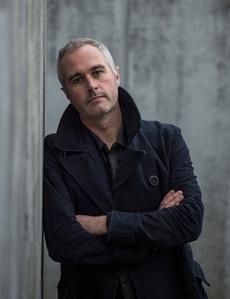
Adrian Walker was born in Australia and raised in the U.K., where he graduated from the University of Leeds and began a career in software. He has written several novels, including From the Storm and The End of the World Running Club. He lives in London with his wife and two children.
The End of the World Running Club tells the story of a man separated from his family after a deadly meteor attack, and his attempt to reunite with them by running across the United Kingdom. Beyond summarizing, though, what would you say the book is about?
At its heart, it's about Edgar Hill, a man at odds with himself and everything around him. It takes a global cataclysm to show Ed how to believe in himself and find purpose. It's also about parenthood, and how running can change you psychologically.
The novel encompasses the hours just before the world shifts completely, the attack itself, and then the long, chaotic days and weeks that follow as the survivors fight for their lives. What drew you to writing about the end of the world?
Ever since I read [Jerry Pournelle and Larry Niven's] Lucifer's Hammer as a teenager, I've been obsessed with the apocalypse! I'm fascinated by the idea that our entire civilization teeters on extinction, and that the events that might tip us over are all perfectly natural and happen all the time. I started with this fascination in mind, but I found as I wrote that the stages of the scenario (which you describe) actually made a fairly good analogy to childbirth and early parenthood. The fear beforehand, the violence of the event, the stress and isolation afterwards. The apocalypse gives you a great array of tools with which to put your characters under pressure, but this extra level really helped me to add meaning to Ed's test. I should stress that I hadn't planned the analogy, but perhaps it was subconscious.
Despite being a less-than-perfect father, Ed shows a ferocity and dedication to his family after he is separated from them. Do you think he could have come into his own as a parent--and even as an individual--without this calamity? Or does it take extraordinary circumstances to create extraordinary people?
To raise children effectively, I think you have to believe in the world you're raising them in, and your place in it. Ed's problem is that he doesn't believe in either, so while I'm sure he would have functioned as a father, he would not have been happy and his family would have noticed that. By the end, hopefully, he has found enough purpose and self-respect to remedy the situation.
You're an avid runner. Have you written about running before? Do you find the act of writing about running brings out new insights or changes the sport at all for you?
Not so much in the writing, but I read a lot about endurance running beforehand (e.g., Born to Run by Christopher MacDougall, Eat & Run by Scott Jurek) and that really changed my perspective, especially on how long-distance running affects your mental state.
Have you ever run distances like the Running Club's trek across the country? What's the strangest thing you've craved, hurt or hallucinated on a long run?
The longest I've ever run is a marathon, but I talked to loads of ultra marathon runners before I wrote the book. My worst injury was when I lived in Edinburgh and we had a terrible winter. The whole city was covered in ice and I got frustrated at not being able to run. One day I did it anyway, hit a patch of black ice as I was crossing the road and knocked my foot out of its socket on the curb, snapping my fibula in the process. I heard the break over the music in my headphones. I remember actually trying to reinsert my foot, thinking that I could just run home on it again. I was in plaster for the next six weeks, and couldn't run for another four months.
On some of his longest running days, Ed starts to hallucinate. Are these hallucinations meant to cast any kind of doubt on his experience as a whole? Do you see him as a reliable narrator?
The ending contains an element of doubt, leaving the reader with certain questions, which I'll let them answer. I've had some interesting responses from U.K. readers, one of which had a particularly chilling take on the whole book which I'd never thought of before! Personally, I veer towards a more hopeful interpretation.
What are you working on now?
My next book is out in the U.K. in September, called The Last Dog on Earth. It's narrated by a foul-mouthed London rescue dog and his owner during a period of social collapse--a lot of fun to write. I'm about to start work on another book, too, which will be out next year, and a reincarnation novel called The Other Lives which I'm self-publishing later this year. Lots in the pipeline! --Kerry McHugh

